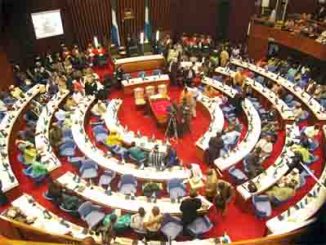
KNOW WHAT IS IN THE NEW PROGRESSIVE ANTI-CORRUPTION (AMENDMENT ACT), 2019
By Francis Ben Kaifala —Anti-Corruption Boss
The Anti-Corruption Commission (ACC) is pleased to inform the Public that His Excellency the President, BRIG. (RTD.) Dr. JULIUS MAADA BIO, on 3rd December, 2019, assented the Act that had been proposed by the Commission and the Office of the Attorney-General and Minister of Justice, The Anti-Corruption (Amendment Act), 2019 thereby completing the process of making it law in Sierra Leone.
The new progressive and very strong anti-corruption law increases the minimum punishment for major corruption offences to a minimum of five (5) years or a fine of not less than Le50,000,000.00 (Fifty Million Leones); strengthens protection of those who assist the Commission – witnesses, informants and whistle blowers; allows the Commission to either prosecute corrupt public officers or recover from them all monies they misappropriate plus a minimum of 10% interest and a mandatory exclusion from holding public office for not less than 3 years; allows the Commission to proceed with trial of accused persons and convict them in absentia; shifts the evidential burden for offences involving offering or receiving an advantage (bribery); and allows the Commission to appeal against sentences that are deemed lenient or disproportionate to the offence charged.
Furthermore, The Anti-Corruption (Amendment Act), 2019, widens the scope of corruption with respect to Offering and Soliciting an Advantage to include accepting, obtaining or receiving an advantage; reduces to three (3) months the hitherto year-long requirement for Public Officers to file asset declaration upon leaving office; Reduces the pool of categories of public officers who are required to declare their assets which will now be limited to Persons in elective offices, Persons appointed by the President, Public officers in grade 7 and above, and Public officers below grade 7 who –(i) handle or control public cash or goods, (ii) make official decisions or recommendations relating to the granting or denial of licenses in regulatory sectors, (iii) conduct research or prepare analytic reports for higher level officials who make critical decisions on financial, economic or regulatory policies, (iv) are in regulatory agencies responsible for regulatory compliance, monitoring and inspection; and further empowers the Commissioner to specify categories of Public Officers outside the foregoing who are required to declare their assets for various reasons and as may be expedient.
Additionally, The Anti-Corruption (Amendment Act), 2019 provides for administrative sanctions for Public Officers who fail to submit their Asset Declaration Forms as and within the time prescribed by the Act including withholding their salaries, suspension from public service after 3 months and removal from public service after 6 months (the last two do not apply to offices for which removal from office is prescribed by the Constitution; but their salaries can be withheld); provides clear redress for public officers who knowingly record false, inaccurate or misleading information; changes the interval for declaring assets from annually to bi-annually to give room for analysis and proper tracking; dispenses with need for Commissioners of Oath to attest Asset declaration forms and replaces it with Penal Affirmation either electronically or personally; and creates room for the digitization of the declaration process and regime.
Finally, The Anti-Corruption (Amendment Act), 2019 vests in the Office of the Commissioner power to direct that contracts may not be proceeded with where the Commissioner, in concurrence with the Chief Executive of the National Public Procurement Authority, has reason to believe that a contract is not in the national interest (having corrupt elements which are clearly defined in the Act). It also adds severe consequences for a public officer who proceeds to sign the contract having received the Commissioner’s notification including imprisonment and a hefty fine after summary trial. It also creates a clear power for the commission to investigate examination malpractices with punishment including 5 years imprisonments for culprits who engage in, aid, abet, counsel or procure it; etc.
The Commission wishes to thank His Excellency President, BRIG. (RTD.) Dr. JULIUS MAADA BIO, and PARLIAMENT for courageously promulgating and enacting these far-reaching and very progressive reforms that will certainly revolutionize the national campaign against corruption in the country, consolidate and expand the gains made so far by making corruption a high risk and low return venture, and making corruption control legal and regulatory framework more robust.
We remain committed to introducing legal, policy and regulatory reforms that suit the corruption culture and environment to make the difference required in Sierra Leone’s long battle against historically endemic corruption.
For further enquiries on this and other ACC matters, please contact MARGARET MURRAY, Public Relations Officer on +232-78-832131.




